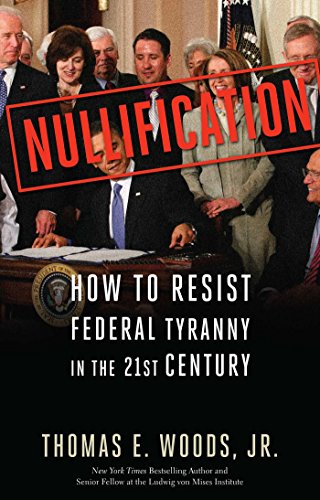The James Madison Passage They Keep Buried
November 17, 2018
I wrote about this earlier this week.
But this one deserves a double dip.
Whitaker has made friendly remarks about nullification. This is not allowed, even though Thomas Jefferson said the states could nullify unconstitutional federal laws.
(No modern critic of the idea ever mentions Jefferson’s name. They’re afraid if we know Jefferson supported it, we peons might get ideas.)
CNN legal analyst Renato Mariotti offered these deep thoughts:
 Nullification: How to ...
Best Price: $2.00
Buy New $10.99
(as of 05:55 EST - Details)
”‘Nullification’ was a legal argument made by Southerners before
the Civil War who believed their states could ‘nullify’ federal law.
That argument was discredited after their defeat in the Civil War, but
it was made again by racists opposing desegregation. And now by
Whitaker.”
Nullification: How to ...
Best Price: $2.00
Buy New $10.99
(as of 05:55 EST - Details)
”‘Nullification’ was a legal argument made by Southerners before
the Civil War who believed their states could ‘nullify’ federal law.
That argument was discredited after their defeat in the Civil War, but
it was made again by racists opposing desegregation. And now by
Whitaker.”I document the actual history of nullification in some detail in my book Nullification. Mariotti’s version reads like a third-grade essay, with a dash of Orwell.
On my podcast the other day I smashed Mariotti’s little lecture to smithereens.
In a later Tweet he berated Whitaker for his disparagement of judicial review.
Warned Mariotti: “The government could pass a law imprisoning journalists and no court could review it.”
Well, guess what: the government did pass a law like that, in 1798, and a lot of good the Court did. It was only at the state level that a spirit of resistance could be found.
Even if the Court had reviewed the law, what is the chance a bunch of robed Federalists were going to overturn the Alien and Sedition Acts?
And that, according to James Madison in the Report of 1800, is why we have state nullification: when the three branches of the federal government betray us — yes, even the demigods of the Supreme Court — the states have the final say.
I guarantee you did not come across this passage in school, at any level:
 Meltdown: A Free-Marke...
Best Price: $1.25
Buy New $5.00
(as of 06:05 EST - Details)
Meltdown: A Free-Marke...
Best Price: $1.25
Buy New $5.00
(as of 06:05 EST - Details)
The resolution [the famous Virginia Resolutions of 1798] supposes that dangerous powers, not delegated, may not only be usurped and executed by the other departments, but that the judicial department also may exercise or sanction dangerous powers beyond the grant of the Constitution; and, consequently, that the ultimate right of the parties to the Constitution [“the parties to the Constitution” are the states], to judge whether the compact has been dangerously violated, must extend to violations by one delegated authority, as well as by another; by the judiciary, as well as by the executive, or the legislature.
However true, therefore, it may be, that the judicial department, is, in all questions submitted to it by the forms of the Constitution, to decide in the last resort, this resort must necessarily be deemed the last in relation to the authorities of the other departments of the government; not in relation to the rights of the parties to the constitutional compact, from which the judicial as well as the other departments hold their delegated trusts.
 What
Madison means in the second paragraph above is that while the judicial
branch may be considered the final authority on constitutionality
between itself and the executive and legislative branches of the federal
government, it is not the final authority between itself and the states. The states, holding the initial repository of power and the architects of the whole system, are of course the ultimate voice.
What
Madison means in the second paragraph above is that while the judicial
branch may be considered the final authority on constitutionality
between itself and the executive and legislative branches of the federal
government, it is not the final authority between itself and the states. The states, holding the initial repository of power and the architects of the whole system, are of course the ultimate voice.Folks like Mariotti think they’re the smart ones, and people who disagree with them are backward hicks.
Exactly the opposite is true.
Feast your ears:
And then subscribe (for free, of course), to the libertarian podcast that tens of thousands have made part of their daily rotutine:
Tom Woods [send him mail; visit his website] is the New York Times bestselling author of 12 books and host of the Tom Woods Show, which libertarians listen to every weekday. Get a free copy of Bernie Sanders Is Wrong.
Copyright © 2018 Tom Woods
Previous article by Tom Woods: Our Low-IQ Elit
No comments:
Post a Comment